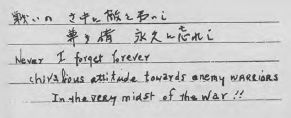- Author
- Date, John C., RANVR (Rtd)
- Subjects
- History - general
- Tags
-
- RAN Ships
- HMAS Sydney I
- Publication
- September 1989 edition of the Naval Historical Review (all rights reserved)
In the sea action on 9 November, 1914 off Cocos Islands in the Indian Ocean, between the Australian cruiser HMAS Sydney and the German cruiser SMS Emden, a kindly gesture was acknowledged as shown in the copy letter below.
H.M.S. Hampshire,
6.XII.14.
Dear Sir
I enclose herewith your white shirts you had the kindness to lend us on board the “Sydney” Dr. Luther and I thank you very, very much.
We are very sorry indeed not to be able to send these shirts back to you washed as we had no opportunity. I hope you will not be too angry about it.
We never will forget all the kindness we got during the time on board the “Sydney” and wish to you all a good voyage.
Please give my special compliments to Mr Lavaye and Garist.
I am yours sincerely, Fritthacft Oberlentmant Snr. Sec.
Dr. Darbey
Esqu.
H.M.A.S. “Sydney“
Only the next month on the 8 December, 1914, in the far away Battle of the Falkland Islands in the south Atlantic Ocean, the flag officer of the victorious British squadron Vice Admiral Sir Frederick Sturdee was to signal to Commander Pockhammer, the senior surviving German officer, “The Commander-in-Chief is very gratified that your life has been spared and we all feel that the Gneisenau fought in a most plucky manner. Unfortunately the two countries are at war; the officers of both navies, who can count friends in the other, have to carry out their country’s duties which your Admiral, Captain and officers worthily maintained to the end.” Sturdee received the equally chivalrous reply, “In the name of all our officers and men saved, I thank Your Excellency for your kind words. We regret, as you, the course of the fight, as we have personally learned to know during peace time the English navy and her officers. We are most thankful for our good reception.”
At the naval Battle of Matapan on 28/29 March, 1941, in the Mediterranean Sea, as the British fleet had to leave many Italian survivors in the water, Admiral Sir A.B. Cunningham sent a signal to the Italian C-in-C, on the mercantile radio distress wave, “Have been endeavouring to pick up your survivors from last night’s action but forced to abandon them due to heavy bombing attacks. If you send fast hospital ship to position Lat . . . Long … it will be given safe conduct.” The reply came back, “Thank you, this will be done.” with the hospital ship Gradisca eventually saving a further 160 men.
On the night of 31 May, 1942, Japanese midget submarines attacked Sydney Harbour and in the resulting action two midget submarines were destroyed.
The bodies of the four Japanese recovered from the midgets were cremated at Rookwood Cemetery, Sydney. The funeral was carried out with full naval honours, the coffins draped with the Japanese ensign, a volley fired by a saluting party and was attended by Rear Admiral G.C. Muirhead-Gould, C-in-C, Sydney, with the ashes of the crewmen being returned to Japan.
Following is a literal translation of a more recent acknowledgement.

These few examples of chivalry and courtesy in war are worth reflecting upon…




